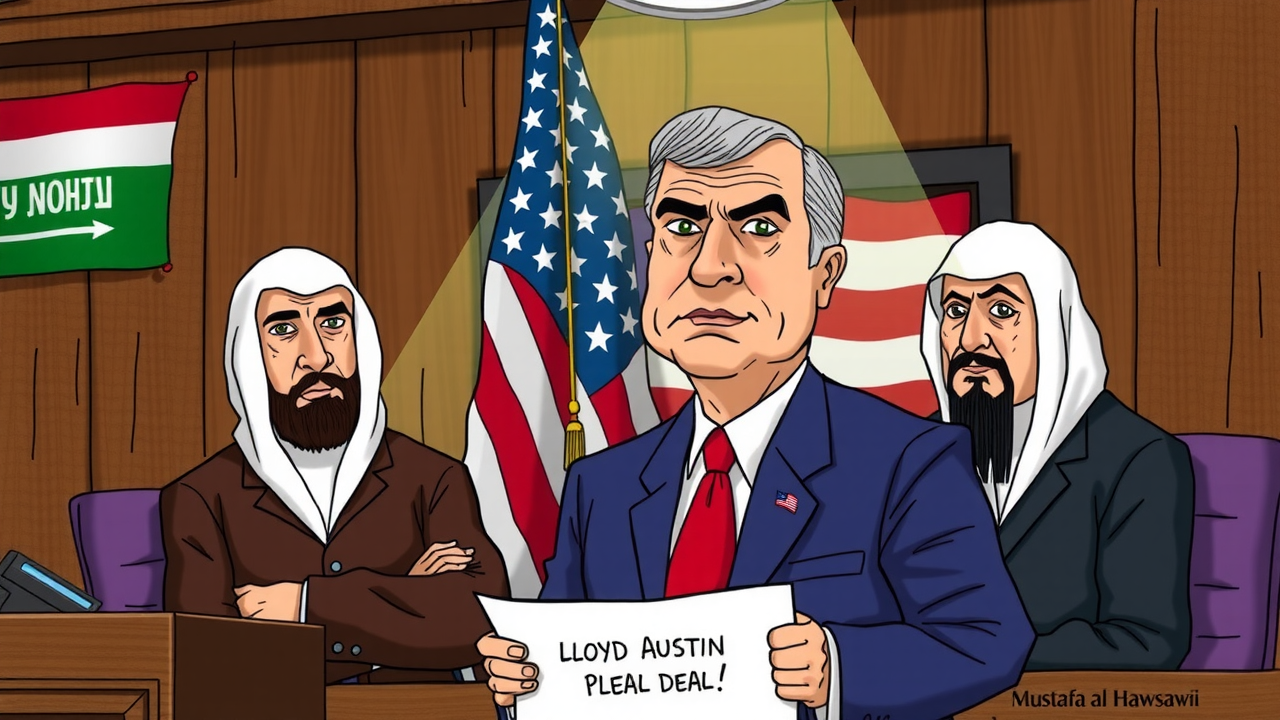On Friday, US Defense Secretary Lloyd Austin rejected a plea deal that would have prevented three alleged 9/11 attack planners from facing the death penalty. Earlier, Khalid Shaikh Mohammed, Walid Bin ‘Attash, and Mustafa al Hawsawi had agreed to plead guilty in exchange for life sentences. The prop

On Friday, US Defense Secretary Lloyd Austin rejected a controversial plea deal that would have spared three alleged 9/11 terror attack planners from facing the death penalty. Earlier in the week, a letter to the families of 9/11 victims revealed that the alleged co-conspirators Khalid Shaikh Mohammed, Walid Bin ‘Attash, and Mustafa al Hawsawi had pled guilty to orchestrating the attacks that claimed nearly 3,000 lives on September 11, 2001.
Plea Deal Proposal:
- Letter to Victims’ Families: The letter, released on Wednesday, indicated that the three accused agreed to plead guilty to all charges, including the murder of 2,976 people listed in the charge sheet.
- Prosecutors’ Statement: “In exchange for the removal of the death penalty as a possible punishment, these three Accused have agreed to plead guilty to all of the charged offenses, including the murder of the 2,976 people listed in the charge sheet, and to be later sentenced by a panel of military officers.”
Controversy and Lawmakers’ Reaction:
- The deal sparked controversy, prompting US lawmakers to demand answers from the White House, which denied involvement and distanced itself from the negotiations.
- White House Response: The administration clarified it had no part in the plea negotiations.
Austin’s Intervention:
- Lloyd Austin’s Decision: Later on Friday, Austin intervened by writing to Susan Escallier, a retired brigadier general serving as Convening Authority for Military Commissions.
- Austin’s Letter: “I have determined that, in light of the significance of the decision to enter into pre-trial agreements with the accused in the above-referenced case, responsibility for such a decision should rest with me as the superior convening authority under the Military Commissions Act of 2009. Effective immediately, I hereby withdraw your authority in the above-referenced case to enter into a pre-trial agreement and reserve such authority to myself.”
Prosecutors’ Acknowledgment:
- Military Prosecutors’ Letter: In their letter to the victims’ families on Wednesday, prosecutors acknowledged the controversy: “We recognize that the status of the case in general, and this news in particular, will understandably and appropriately elicit intense emotion, and we also realize that the decision to enter into a pre-trial agreement will be met with mixed reactions amongst the thousands of family members who lost loved ones.”
- Reason for Plea Deal: They justified the plea deal as the “best path to finality and justice” after 12 years of pre-trial litigation.
Victims’ Families and Public Reaction:
- Victims’ Families Reaction: Some family members expressed anger and disappointment. One spouse of a 9/11 victim voiced frustration: “I am angry and disappointed that enemy combatants who killed thousands of Americans in our homeland are now able to exploit the U.S. judicial system to their benefit, receiving support from American taxpayers for shelter, food, and healthcare for the rest of their lives.”
ACLU’s Position:
- ACLU’s Support for Plea Deal: The American Civil Liberties Union (ACLU), representing Mohammed and others, supported the initial plea agreement, calling it the “right call” and the “only practical solution” after nearly 20 years of pre-trial litigation.
- ACLU’s Statement: “For too long, the U.S. has repeatedly defended its use of torture and unconstitutional military tribunals at Guantánamo Bay. The military commissions were doomed from the start and the government’s torture of these defendants makes this plea both necessary and just.”
Controversy Over Torture:
- Use of Torture: The use of torture at Guantanamo Bay was a controversial part of the US government’s response to the 9/11 attacks. Enhanced interrogation techniques, widely considered torture, were used on detainees suspected of terrorism.
- Bybee Memo: Written in 2002 by Justice Department official Jay Bybee, this memo provided legal justification for these techniques by narrowly defining torture and arguing for broad executive authority in national security matters.
- As of the time of publication, the ACLU had not commented on Austin’s withdrawal of the agreement.





